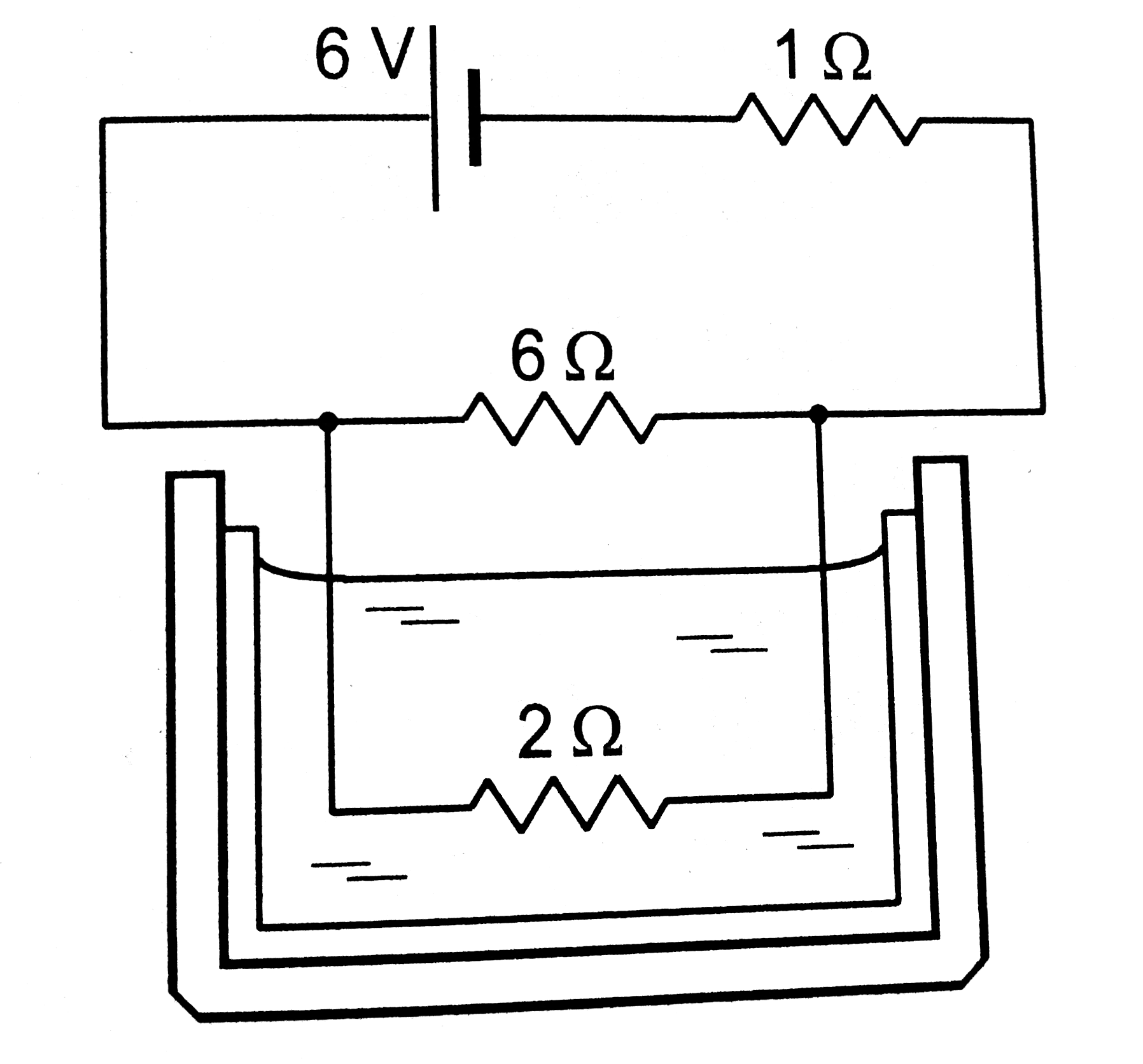The 2.0Ω resistor show in figure is dipped into a calorimeter containing water. The heat capacity of the calorimeter together with water is 2000JK−1. (a) If the circuit is active for 15 minutes, what would be the rise in the temperature of the water? (b) Suppose the 6.0Ω resistor gets burnt. What would be the rise in the temperature of the water in the next 15 minutes? (Figure)

The correct Answer is:A, B, C
Reff=(128)+1
=(32)+1=52
I=125amp
Here I'×6=(i−i)2
⇒I'6=(125)×2−2i'
⇒8i=245
⇒I'=24(5×8)=35amp.So,
i×j'=125−35=95amp.(a)Heat
=i2Rt
=(95)×(95)×2×15×60
=81×36×2=5832
2000Jofheatraisesthetemp.by1K5832Jraisesthetemp.by2.916K(b)When
6Ω
resis→r≥tsburnt
Reff=1+2=3Ω
i=63=2amp
=2×2×2×15×60=7200J
2000Jraisesthetemp.by1K7200Jraisesthetemp.by3.6K
Topper's Solved these Questions
- BOOK - HC VERMA ENGLISHCHAPTER - THERMAL AND CHEMICAL EFFECT OF ELECTRIC CURRENTEXERCISE - Short Question9videos
THERMAL AND CHEMICAL EFFECT OF ELECTRIC CURRENT
- BOOK - HC VERMA ENGLISHCHAPTER - THERMAL AND CHEMICAL EFFECT OF ELECTRIC CURRENTEXERCISE - Objective 25videos
THERMAL AND CHEMICAL EFFECT OF ELECTRIC CURRENT
- BOOK - HC VERMA ENGLISHCHAPTER - THE SPECIAL THEORY OF RELATIVITYEXERCISE - Short answer2videos
THE SPECIAL THEORY OF RELATIVITY
- BOOK - HC VERMA ENGLISHCHAPTER - X-RaysEXERCISE - Ques for Short Ans10videos
X-Rays
Similar Questions
Knowledge Check
- Question 1 - Select One
With the rise in temperature the solubility of sodium chloride in water :
ADecreasesBIncreases and then decreasesCIncreases sharplyDIncreases only a little - Question 2 - Select One
The molar heat capacity of water at constant pressure, Cp is 75 J K−1mol−1. When 10 kJ of heat is supplied to 1 kg water which is free to expand, the increase in temperature of water is
A(a) 2.4 KB(b) 4.8 KC(c) 3.2 KD(d) 10 K
The initial and final temperatures of water in a container are observed as 16±0.6∘C and 56±0.3∘C. What is the rise in the temperature of water.
View SolutionWater falls from a height 500 m. what is the rise in temperature of water at bottom if whole energy remains in the water?
View SolutionAn electrically heated coil is immersed in a calorimeter containing 360 g of water at 10∘C. The coil consumes energy at the rate of 90 W. The water equivalent of calorimeter and coil is 40 g. The temperature of water after 10 min is
View SolutionAn electrically heated coil is immersed in a calorimeter containing 360 g of water at 10∘C. The coil consumes energy at the rate of 90 W. The water equivalent of calorimeter and coil is 40 g. The temperature of water after 10 min is
View SolutionThe temperature of 600 g of cold water rises by 15∘C when 300 g of hot water at 50∘C is added to it. What was the initial temperature of the cold water ?
View SolutionThe molar heat capacity of water at constant pressure, Cp is 75 J K−1mol−1. When 10 kJ of heat is supplied to 1 kg water which is free to expand, the increase in temperature of water is
View Solution

